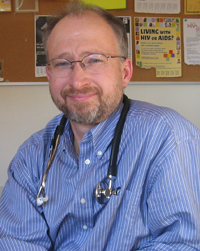Attention to Cure Research Expanding on Multiple Fronts

amfAR grantee Steven Deeks,
M.D., co-chaired a session on cure research at the recent DART
conference.
|
January 19, 2011— Scientific interest in the search for a cure for HIV/AIDS has been building over the past few years, a groundswell that is generating a critical mass of activity among researchers and scientific organizations, including amfAR.
Special sessions at major scientific conferences on the prospects for a cure and noteworthy new commitments to research into a cure from amfAR and others are contributing to this wave of guarded optimism in the scientific community. Public interest in the subject has also been piqued by the December 2010 publication in the journal Blood of a peer-reviewed paper on the Berlin patient—the HIV-positive man whose cure via a stem-cell transplant inspired new hope for cure research.
“This year we are finally seeing real momentum building for research towards a cure,” said Rowena Johnston, Ph.D., vice president and director of research at amfAR. “amfAR has funded projects whose results have sharpened our understanding of the barriers to a cure and revealed some promising leads to investigate. It’s immensely gratifying to see that a growing number of scientists are paying serious attention to the issue.”
In February, amfAR will announce a new round of research grants for projects that will explore the mechanisms for HIV persistence even in the face of drug therapy, and the potential for HIV eradication. “We received a very high number of applications proposing a range of basic and clinical studies, and they came from a wider group of countries than ever before,” said Johnston.
The centerpiece of amfAR’s cure-focused research, the amfAR Research Consortium on HIV Eradication (ARCHE), will make its second round of grants in 2011, even as current ARCHE grantees push forward with a series of collaborative studies. (Click here to read more about ARCHE investigations.)
Awakened interest in cure research was further illustrated in December 2010 at the DART 2010 conference, where the opening session addressed the search for a cure. A number of amfAR grantees were among featured presenters, including ARCHE investigator Steven Deeks, M.D.; Daria Hazuda, Ph.D., who serves on amfAR’s Program Advisory Council; and Sharon Lewin, M.D., a past amfAR grantee who is currently mentoring a recipient of amfAR’s Krim Fellowships.
In early March, the Conference on Retroviruses and Opportunistic Infections (CROI)—the top biomedical conference on HIV/AIDS in the U.S.—will also address the issue with a symposium dedicated to obstacles to a cure.